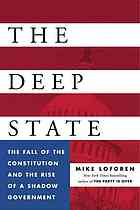
The Deep State
The Fall of the Constitution and the Rise of a Shadow Government
کتاب های مرتبط
- اطلاعات
- نقد و بررسی
- دیدگاه کاربران
نقد و بررسی

October 15, 2015
An insider's account of the "secret and unaccountable shadow government" that really runs the country. Former Congressional staffer Lofgren (The Party Is Over: How Republicans Went Crazy, Democrats Became Useless, and the Middle Class Got Shafted, 2012) draws on nearly three decades of work in national security and military affairs to provide an overview of the web of power brokers extending from Wall Street to Washington, D.C., to Silicon Valley. They ensure--no matter which political party is in power--the continuation of policies behind "the war on terrorism and the militarization of foreign policy, the financialization and deindustrialization of the American economy, the rise of a plutocratic social structure that has given us the most unequal society in almost a century, and the political dysfunction that has paralyzed day-to-day governance." No conspiracy, writes the author, this hidden "Deep State" has arisen from historical circumstances dating to the end of World War II. Its leaders, from government, finance, and industry, are united in a web of influence that includes contractors, think-tank experts, lobbyists, and other nonelected players, all connected by money and mutual goals. The resulting political oligarchy "maintain[s] the outward form, but not the spirit, of constitutional government." While offering no startling revelations, Lofgren ably details the history and influence of this behind-the-scenes ruling class, whose members shuttle between high posts in corporations and government (and among government administrations), with occasional think-tank and Ivy League teaching stints. They include such individuals as Donald Rumsfeld (the "most egregious" example of these elite players' "boundless self-confidence" and "overweening sense of self-importance"), former Gen. David Petraeus (now at KKR, an equity firm), and Paul Wolfowitz (at the American Enterprise Institute). In the wake of his alarming, often barbed chronicle of these well-entrenched bureaucrats, Lofgren's suggested reforms--e.g., eliminating money from politics, downsizing the military, and staying out of the Middle East--will strike many as absurd. Mostly intriguing in its historical analysis but lacking in useful countermeasures or solutions.
COPYRIGHT(2015) Kirkus Reviews, ALL RIGHTS RESERVED.

Starred review from February 1, 2016
Lofgren (The Party Is Over) argues that the shared-power, balanced participation vision embodied in our Madisonian constitutional democracy is pretty much a mirage, and that our "visible state" is manipulated greatly and gravely by "the deep state." What is this threatening Machiavellian machine? According to the author, who spent roughly a generation working in Congress, mostly as a senior policy analyst in the House and Senate, the deep state is "a hybrid association of key elements of government and parts of top-level finance and industry that is effectively able to govern the United States with only limited reference to the consent of the governed as normally expressed through elections." With echoes of Dwight D. Eisenhower's Farewell Address warning in 1961 about the military-industrial complex, Lofgren offers a compelling (depressing?) vision of what happens when a democracy becomes a plutocracy, when political dysfunction reigns supreme over democratic deliberation, and when the war on terrorism leads to the militarization of our foreign policy. Is there no way out? Lofgren proposes reforms from campaign finance to foreign policy to immigration policy. VERDICT A must-read for anyone interested in the health and sanity of our body politic. [See Prepub Alert, 7/6/15.]--Stephen Kent Shaw, Northwest Nazarene Coll., Nampa, ID
Copyright 2016 Library Journal, LLC Used with permission.

























دیدگاه کاربران